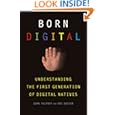
Students today interact with information in entirely different ways than their teachers ever did. While we adapt to use digital information, we also wonder if students have lost some of the ability to process information in their quest to be online, all the time.
This morning I took advantage of new digital capabilities to view and listen to the keynote speech from the Internet Librarian conference while sitting behind the library desk. Vint Cerf, VP & Chief Internet Evangelist for Google, spoke about how people interface with information. He shared that in a recent conversation, Henry Kissinger expressed concern that people are thinking more shallowly about things than they once did; that such communications as emails, Facebook, and Twitter reduce the amount of time we spend thinking about things. Mr. Cerf re-stated this by saying that our culture is trending toward abstraction and brevity. He said that “Power corrupts and PowerPoint corrupts absolutely.”
In education, we love to adopt new technologies and expose our students to as many time-saving gizmos and gadgets as we can. The important thing to remember is that the technology is not the important part. If the technology makes the education more accessible, then we should use it. However, technology for the sake of technology may breed students who no longer have the critical thinking skills to solve the problems of today and tomorrow.
No comments:
Post a Comment